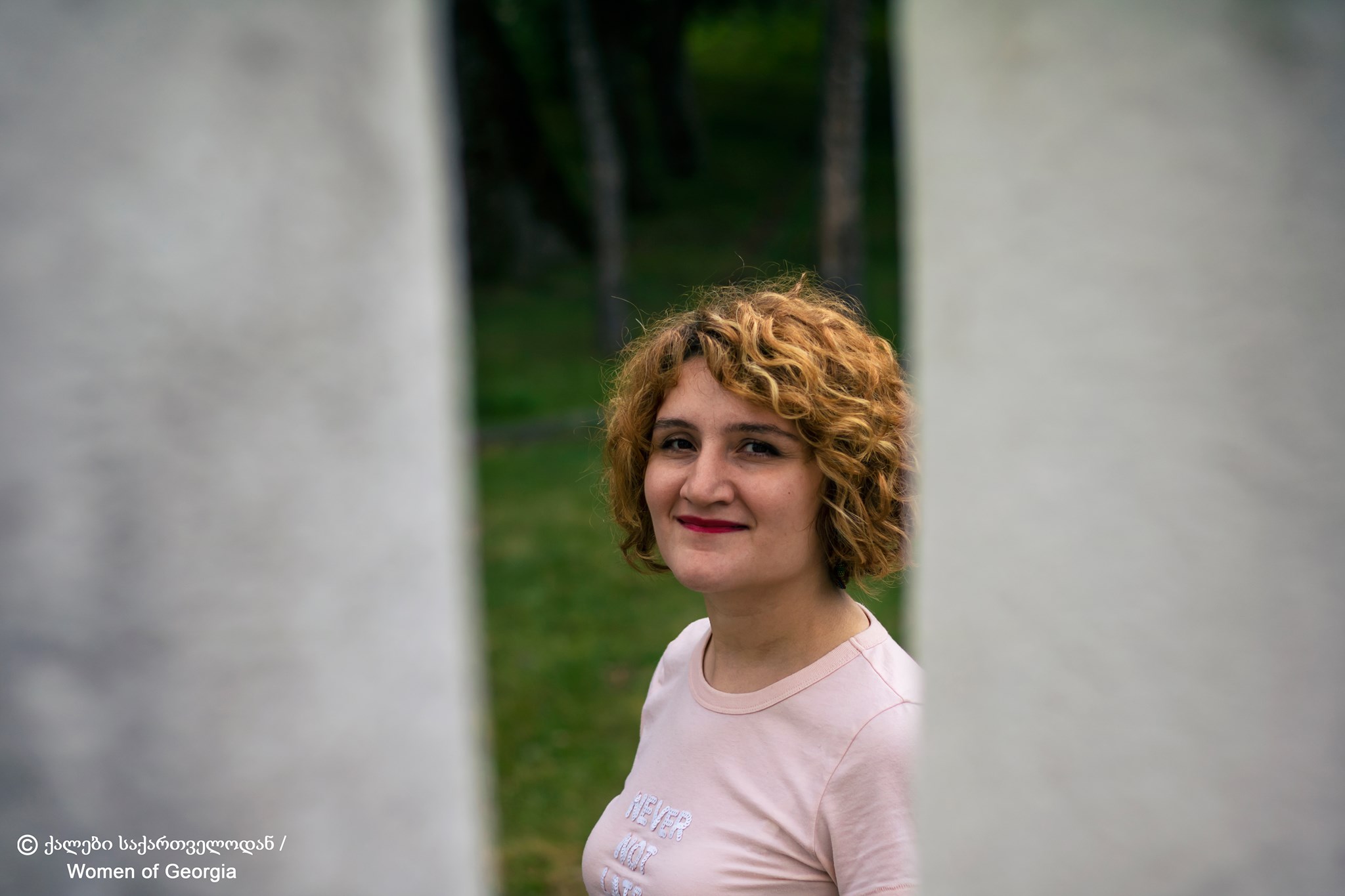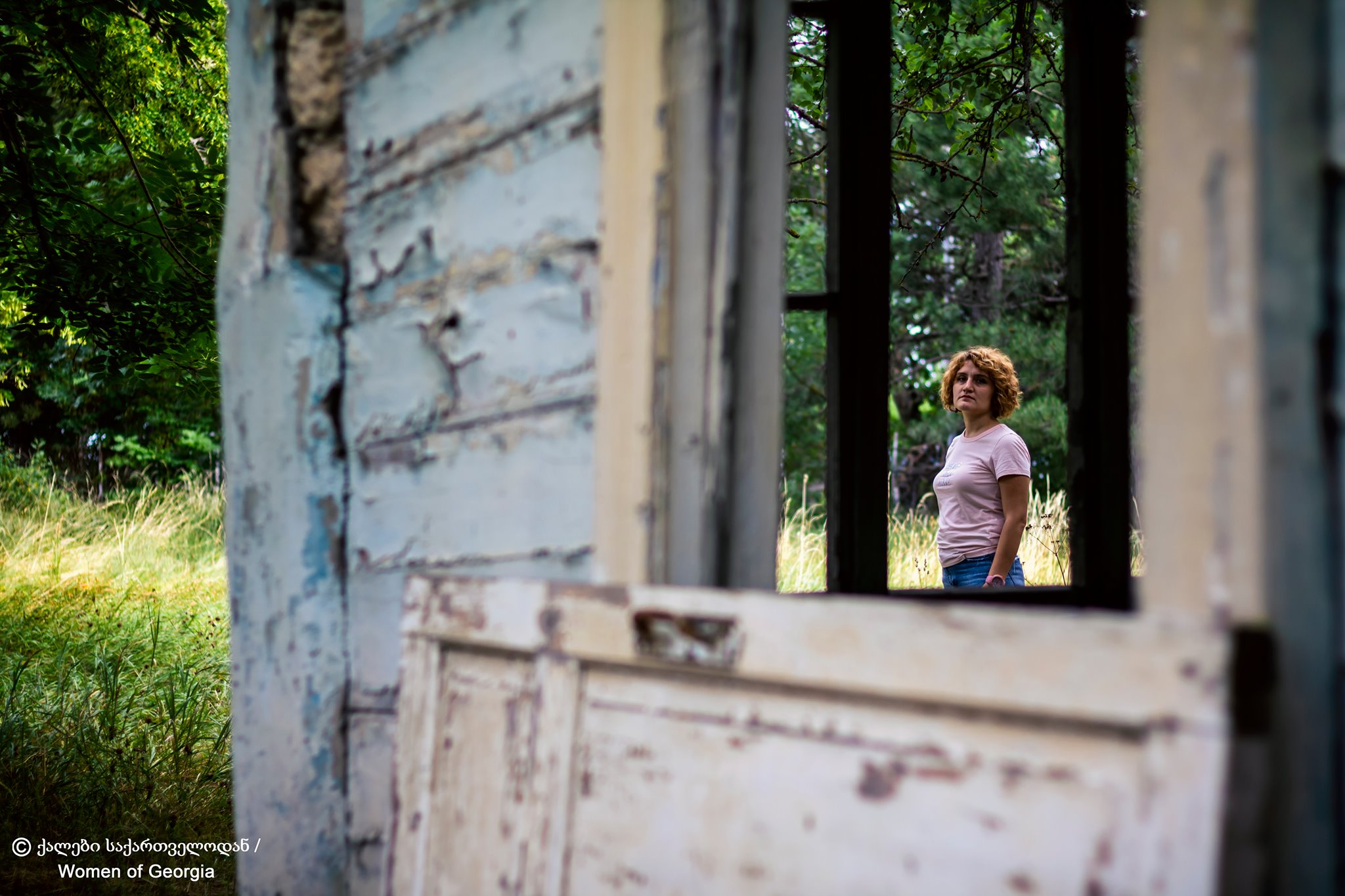Nona Samkharadze, 35 years old, Marneuli
How I became an activist
‘’I call myself a civil activist, but there was a time when I didn’t even know what gender meant and I thought early marriage was a normal thing to do. In 2003, my 15-year-old sister got married and I wasn’t bothered by it. In 2005, I met a woman from Samtskhe-Javakheti, who had founded a women’s rights organization, worked on various projects, and conducted the training. We founded our own small local NGO – ‘’Marneuli Democrat Women’s Society’’.
From 2006, I started working for a local TV station, where I had to wear all the hats – be a producer, journalist, editor, cleaner… In the same year, ‘’Interpressnews’’ conducted a one-year program and then I learned that when conducting a street poll, you shouldn’t only interview men, but that it’s important to ask women for their opinion as well. Before that, in Marneuli, we only interviewed men. I found out that marriage at an early age could be a problem. I was doing stories about these topics – violence, political participation, why there were no female members in the City Council, why did the women only work as secretaries, and so on. However, at first, I was less sensitive to those kinds of issues. They’d just told me what to do and I would go and do it. Later I became more interested and started writing articles about this issue. That’s how this topic slowly came into my life.
In 2010, I received the George Soros foundation grant to study in the Gender Research Program. I ran from my TV job to lectures and suddenly, this girl from Marneuli, from a family of four sisters, went head-first into feminism. I remember from my childhood how people used to say about my father that he had four daughters and if he also had a boy, we would be a perfect family. Back then, I thought that there really was something wrong with our family, because we didn’t have a brother. I never heard my father wish for a boy. He’d take us to a beer pub, let us drink beer and eat khinkali; back then my father sold gasoline and we helped him carry the heavy canisters. I didn’t think that because I was a girl, I was of ‘’weak gender’’ and I wouldn’t be able to do it.
Even now, I think gender studies is one of the best programs. Before that, I was a philologist specialized in Georgian language and literature and changed my primary profession completely. For example, literary works like ‘’Shushaniki’s Torture’’ and “Otarian Widow’’, are taught in a certain way, but later I looked at them from a different angle.
I have been working for “Mercy Corps” since 2011. It’s a huge agricultural program. I’m the information coordinator and I also ensure that the gender ratio between beneficiaries is preserved, to achieve our goal and have equal numbers of male and female farmers. Due to the job and lack of time, lately, I’ve not been involved in civic activism like before. But feminism, gender equality, and equality, in general, is an integral part of my life.
 What’s happening in Marneuli
What’s happening in Marneuli
All the problems that exist elsewhere in Georgia are more acute in our region. Early marriage is still one of our main problems. As soon as attention dwindles, or training are no longer conducted, or discussion ceases, or international organizations become less active, the number of cases immediately increases. I’ve had cases when school directors call their married pupils to warn about an audit and tell them to come for the auditor to see them. That’s how it’s hidden. The directors themselves come from the same tribe, maybe they were married at an early age themselves. Single-day awareness training doesn’t have any effect – only if someone tells them they’ll go to jail and will have to answer to law enforcement. This generation lived 50 years in such a reality. In general, in Marneuli, the state concedes a lot, people know they’ll get off with a fine, they also see how their neighbors and friends got away without punishment and so on.
Also, there’s a big problem when, during childbirth, hospital staff finds out that the mother is a minor and the father is arrested. This kind of prevention is very late. When we talk about this with the DA’s office, they tell us they’re also stumped about this. This needs a complex approach; local government, resource centers, and social service should write a long-term program, and follow through, consistently.
A crisis center was opened in Marneuli. Of course, opening such an important center is great news for us, but it doesn’t work as intended. They only had 6 cases in the last seven months. They have no referrals. Women tell that it would be a shame to be seen entering a building if there’s ‘’Crisis Center’’ written on it. We need completely different approaches to make this center work. They should consider the local context. When the center was opened, they were looking for an Azerbaijani-speaking lawyer, with lots of requirements… An Azerbaijani speaking lawyer, with a diploma. I’m not a lawyer at all, but I think I’d work well at a crisis center – I don’t have knowledge in this field, but I have other skills. There are people in Marneuli who don’t have a legal education, but know the language and are sensitive to these problems. Why is it not possible to hire such a person?! Due to these standard approaches, they couldn’t find anyone in this position that could work with women.
All the trustees of the village are men and we had a problem during the quarantine – Marneuli was in lockdown and in some villages there were no shops. They told people to contact the trustees and they would solve all the problems. But women wrote to us that they wouldn’t sit in a men’s car because they didn’t want to be seen by neighbors.
It is a separate problem that they do not want to sit in a car with a man and we have to fight it differently, but if we do not have any women trustees, out of 35 people, there is not one woman in the City Council, this is also a big problem. Then they complain that when they go to villages, women don’t come out and talk to them. That is why I support women’s political quota.
Privileged women say they’re empowered, but what should we do before we have women like them in the Azerbaijani tribe?]
Here, women are more deprived of information, and the problem of knowing the Georgian knowledge is more acute in women. When you make a girl leave 8th grade and don’t give her education… I know of women that aren’t allowed to go outside the house. Lately, I got the news of two cases of domestic violence in the Georgian tribe, and it was in educated, wealthy families. One girl was the victim of systematic domestic violence from his husband, he beat her; nobody said anything until he beat her in her parents’ house. The parents wondered why she didn’t complain before, but I think it’s impossible to notice when your child is a victim of violence. In the second case, the husband didn’t let his wife go outside, but the overall attitude was that it was a good thing he wasn’t beating her and “only” didn’t let her go outside. I don’t have any information about the current situation about this in the Azerbaijani tribe. Even though I have contacts and a network, I only hear about violence in Georgian and Armenian tribes. Isn’t this also a problem? We don’t know anything about the Azerbaijani tribe, because obedience is more prevalent there and information isn’t coming outside. There’s probably also less awareness about what constitutes violence.
Olga Endeladze and I are radio show hosts, we want to use the tribal space of radio for women; we invite local women and talk to them about different subjects: politics, violence, budgeting, and so on. It’s very hard to find a respondent who will openly talk about this, but we aren’t looking for women with status; we’re looking for normal women.
 People often ask me, why I don’t move to Tbilisi to live. Here, people think this way – if you have a nice salary, can think critically, you must live in Tbilisi. It’s “lame” to live in Marneuli. Many actually move and then commute to work from Tbilisi to Marneuli. This is a very bad trend. I’m not going to leave Marneuli – this is a great opportunity for people like us to stay here. There was such a moment in my life too when my mom moved me to a school in Tbilisi in 8th grade. I always asked her what had I done to her to deserve that. Kids laughed at my accent, at the fact that I was from Marneuli, village Tsereteli. Now I don’t know what attitude people have about such things. I really want to know that there’s no more condescension based on accent and where you come from because I experienced it myself and that forced me to be ashamed for a while of the fact that I was from Marneuli.
People often ask me, why I don’t move to Tbilisi to live. Here, people think this way – if you have a nice salary, can think critically, you must live in Tbilisi. It’s “lame” to live in Marneuli. Many actually move and then commute to work from Tbilisi to Marneuli. This is a very bad trend. I’m not going to leave Marneuli – this is a great opportunity for people like us to stay here. There was such a moment in my life too when my mom moved me to a school in Tbilisi in 8th grade. I always asked her what had I done to her to deserve that. Kids laughed at my accent, at the fact that I was from Marneuli, village Tsereteli. Now I don’t know what attitude people have about such things. I really want to know that there’s no more condescension based on accent and where you come from because I experienced it myself and that forced me to be ashamed for a while of the fact that I was from Marneuli.
Family
My husband is Armenian and has Logoneurosis, a speaking problem. I got to know him in 2008 when he worked at one of the organizations helping refugees. I was a journalist and that’s how we met each other. I liked him a lot. His nationality or Logoneurosis were never problems for me, but I remember meeting resistance, not from my family, but from others. I remember, in an event where there were also my relatives, some women took my sister aside and asked if this was the boy that her sister was marrying. She said he was Armenian and also had a speaking problem, so they had to separate us and not let me marry him. I always heart talks like this behind my back. Just like we women have some standards, it’s like that in men too – you must be orthodox Christian and your family name must end on “dze” or “shvili”. I say openly that my children are Armenians. My oldest kid was born in 2011; back then, due to my feminist beliefs, I wanted him to have two last names, from his mother and father. But I had a lot of problems, including from doctors – they asked me, “what? What the last name? What should I write?” I was very inconvenienced by this, and we also experienced many errors in his documents; my husband has also been asked if he changed his last name to mine. Because of all that, I gave him only his father’s last name. My husband’s grandma is Georgian, but I don’t even want to bring it to attention. So, what? Because he had a Georgian grandma, does that mean he’s a better Armenian?! He doesn’t have a language barrier, speaks fluent Georgian and thinks, that everybody should speak the official state language. He says that if someone told him how good it is that he speaks Georgian, he’d be offended. He has a very high sense of civic responsibility; he’s an activist, he’s even collecting signatures right now to be able to build a playground. He doesn’t think that he’s a second-class citizen just because he’s Armenian.
When I stop talking about feminism, my husband continues the conversation. We do household chores equally. He’s a very ardent supporter of women and greatly understands, that washing dishes is a question of hygiene, not the gender of who’s doing it. He knows that when he’s feeding a baby, he’s not helping the woman, but he’s simply feeding his kid and it’s his responsibility too. He didn’t have to undergo training to learn that and he didn’t even change after meeting me. Armenian and Georgian ways of raising a kid don’t differ much, and when I ask him how he turned out to be so great, he answers that he was brought up in such a family. He’s a very good person, I love him very much and our values are fully aligned.
I teach my children that they’re the descendants of two cultures and they must be proud of it, never be ashamed of it. They always follow me well in this discussion and I’m sure they’ll find their ways in life.
Author: Nino Gamisonia
Photo: Nino Baidauri
Translation: Mariam Kajrishvili

